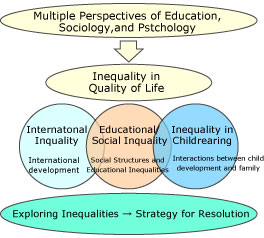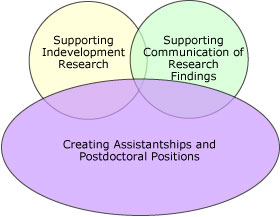Outline of the plan for establishing the G-COE
| Institution Name | Ochanomizu University |
| Program title | Science of Human Development for Restructuring the “Gap-Widening Society” |
| Department of graduate school | Graduate School of Humanities and Sciences |
| Program members | 16 menbers |
| Program Leader | Mimizuka Hiroaki |
A. Aim of the establishing the COE
The proposed COE will be established at the Ochanomizu University Graduate School of Humanities and Sciences to foster scholarship in the field of human development sensitive to social inequality and social justice. In response to the given changes in the society, the proposed COE envisions scholarship that advances knowledge and at the same time addresses issues critical to our society through both academic training and research activities. Particular emphasis will be placed on the professional development of female researchers. In order to realize our vision, we strive to create a structure that enables and encourages synergistic interactions among researchers from different fields.
Firstly the COE will focus its educational programs on meeting the needs of qualified students and junior scholars worldwide. This commitment is based on reflections about the traditional academic climate which has resulted in the following problems:
- Lack of communication and collaboration across disciplines.
- Dichotomy between academic research and social practices.
- Indifference to meeting societal needs.
By creating scholarship that meets the needs of contemporary society, these problems may be resolved. The proposed COE defines such scholarship as being sensitive to social justice, and our plan of professional training is based on this philosophy. Thus, we will devise two levels of training, foundational and innovative training, for graduate students and junior scholars.
Next, in response to the rapid growth of social inequalities in Japan, inequalities occurring throughout lifespan development will be explored in terms of international, educational /social, and childrearing inequalities. Three research groups will be formed in correspondence with these three research areas. Empirical studies will be conducted to bring inequalities to the fore and to propose resolutions to abolish such disparities.
B. Outline of the plan for establishing the COE
1. Organizational Structure
The university president at the Ochanomizu University Graduate School of Humanities and Sciences leads the COE for both academic training and research activities. The COE is organized into three research groups, composed of faculty members, postdoctoral scholars, and graduate students: the International Inequality, Educational/Social Inequality, and Inequality in Childrearing Groups as shown in Figure 1. The COE emphasizes collaborative relationships among the three groups by deploying “overlapping members” who are involved in more than two groups and in charge of strengthening the linkages among the groups.

Figure 1 Organization of the Proposed COE
The COE sets up the Education Committee, the Research Program Committee, and the Center for Longitudinal Research in Human Development (tentative title, research organization) as organizational structures to promote education and research activities. The Education Committee involves graduate students as well as the COE faculty members, and runs the Foundational Training Program and the Innovative Training Program, which are described in the next section. The Research Program Committee involves COE faculty members, visiting professors, and early career scholars to promote research activities. The Center for Longitudinal Research in Human Development serves as the most advanced research resource for large-scale studies of human development through the lifespan. The Center bridges the groups of the COE and the University Attached Schools (Attached Kindergarten, Attached Elementary School, Attached Junior High School, and Attached Senior High School) to promote collaboration between scientific researchers and educational practitioners.
The COE also operates an External Review Committee and an Ethics Committee for research conduct. The External Review Committee reports its findings to the University President. The Ethics Committee takes over the equivalent activities of the previous COE program and reviews research proposals under the COE.
2. Graduate Education and Professional Training Program
The primary goal of the COE is to foster scholarship sensitive to social justice. This goal is achieved by the establishment of the Graduate Education and Professional Training Program, which is comprised of the Foundational Training and the Innovative Training.
Foundational Training Program
This program provides students with three core opportunities for the career development of scholars: support for independent research opportunities, support for communication of research findings, and providing academic positions such as assistantships and postdoctoral positions (Figure 2).

Figure 2 Foundational Training Program
Innovative Training Program
The Innovative Education/Training Program has two specific missions: promotion of scholarship that meets society's needs, and facilitation of an active role of the Ethics Committee.
3. Research activities
The focus of the proposed COE centers around social inequalities and their effects on the human development of individuals. The gap-widening phenomenon, or the rapidly growing income inequality, is viewed as one of the most prominent changes in Japanese society. At the proposed COE, social inequalities throughout human development are approached from education, psychology, and sociology. It is expected that such a "multiple approach" will shed light on the perpetuation of social inequality and describe pathways to the reduction of a “gap-widening society”. Inequalities in our society should be captured in the context of neo-liberalism, de-structuring of welfare state, and especially the substitution of "parentocracy" for meritocracy. Focusing on the study of inequalities, and particularly how they develop and are maintained, we aim to discern mechanisms of social change and to propose solutions to transform the related social structures.
Research activities of the proposed COE will be conducted by three research groups: International Inequality Research Group, Educational/Social Inequality Research Group, and Inequality in Childrearing Research group (Figure 1). Three groups liaise with each other to find resolutions for various forms of social inequalities.
 Pampflet
Pampflet





